Workplace Decision Making and Ethics
VerifiedAdded on 2020/03/23
|6
|1463
|151
AI Summary
This assignment delves into the complexities of ethical decision-making within a workplace setting. It examines the crucial role of considering emotional impacts alongside factual information during the decision-making process. Key legal frameworks such as the Fair Labour Standards Act and the Equal Opportunity Act are discussed, highlighting their relevance to ethical conduct. The importance of Work Health Safety legislation in ensuring employee well-being and productivity is also emphasized.
Contribute Materials
Your contribution can guide someone’s learning journey. Share your
documents today.
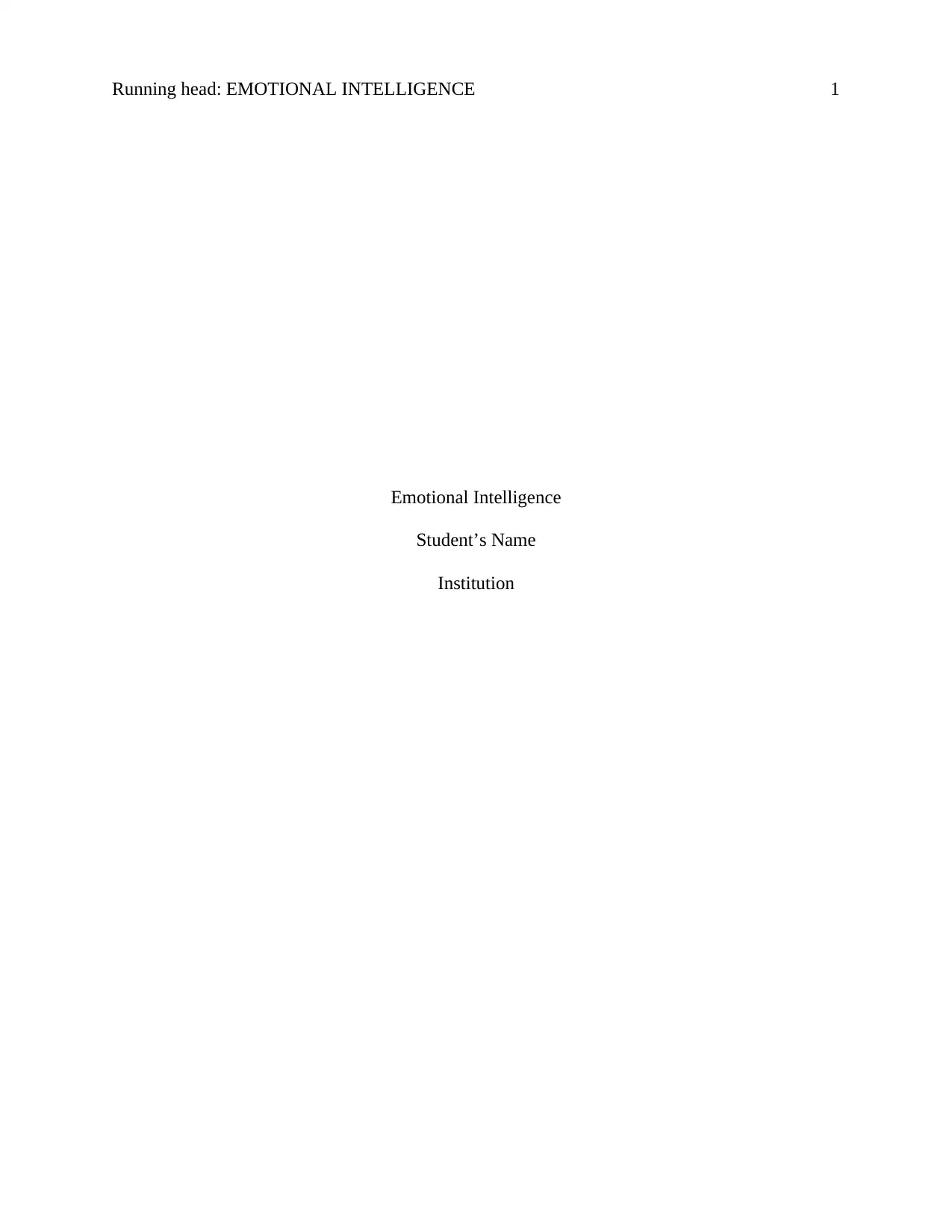
Running head: EMOTIONAL INTELLIGENCE 1
Emotional Intelligence
Student’s Name
Institution
Emotional Intelligence
Student’s Name
Institution
Secure Best Marks with AI Grader
Need help grading? Try our AI Grader for instant feedback on your assignments.
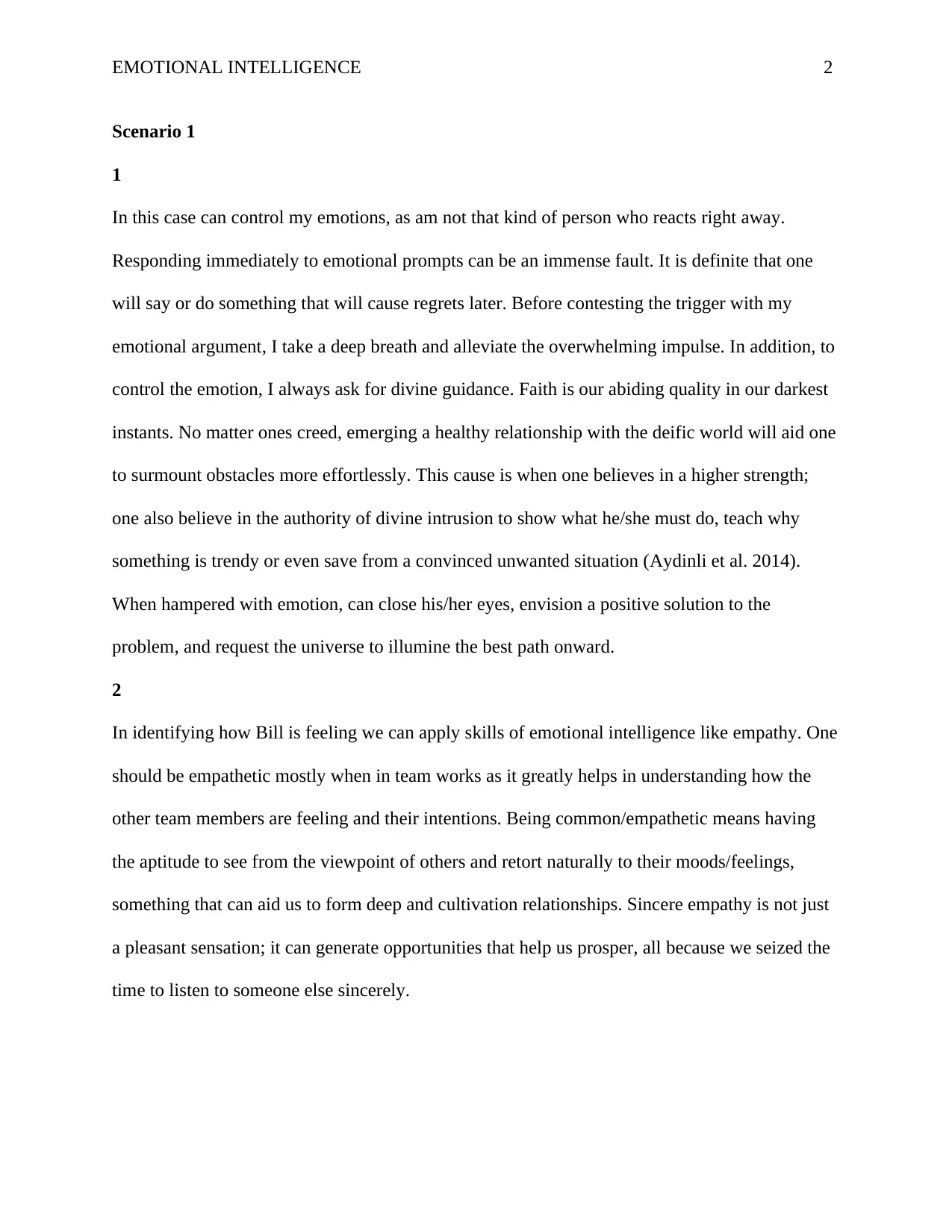
EMOTIONAL INTELLIGENCE 2
Scenario 1
1
In this case can control my emotions, as am not that kind of person who reacts right away.
Responding immediately to emotional prompts can be an immense fault. It is definite that one
will say or do something that will cause regrets later. Before contesting the trigger with my
emotional argument, I take a deep breath and alleviate the overwhelming impulse. In addition, to
control the emotion, I always ask for divine guidance. Faith is our abiding quality in our darkest
instants. No matter ones creed, emerging a healthy relationship with the deific world will aid one
to surmount obstacles more effortlessly. This cause is when one believes in a higher strength;
one also believe in the authority of divine intrusion to show what he/she must do, teach why
something is trendy or even save from a convinced unwanted situation (Aydinli et al. 2014).
When hampered with emotion, can close his/her eyes, envision a positive solution to the
problem, and request the universe to illumine the best path onward.
2
In identifying how Bill is feeling we can apply skills of emotional intelligence like empathy. One
should be empathetic mostly when in team works as it greatly helps in understanding how the
other team members are feeling and their intentions. Being common/empathetic means having
the aptitude to see from the viewpoint of others and retort naturally to their moods/feelings,
something that can aid us to form deep and cultivation relationships. Sincere empathy is not just
a pleasant sensation; it can generate opportunities that help us prosper, all because we seized the
time to listen to someone else sincerely.
Scenario 1
1
In this case can control my emotions, as am not that kind of person who reacts right away.
Responding immediately to emotional prompts can be an immense fault. It is definite that one
will say or do something that will cause regrets later. Before contesting the trigger with my
emotional argument, I take a deep breath and alleviate the overwhelming impulse. In addition, to
control the emotion, I always ask for divine guidance. Faith is our abiding quality in our darkest
instants. No matter ones creed, emerging a healthy relationship with the deific world will aid one
to surmount obstacles more effortlessly. This cause is when one believes in a higher strength;
one also believe in the authority of divine intrusion to show what he/she must do, teach why
something is trendy or even save from a convinced unwanted situation (Aydinli et al. 2014).
When hampered with emotion, can close his/her eyes, envision a positive solution to the
problem, and request the universe to illumine the best path onward.
2
In identifying how Bill is feeling we can apply skills of emotional intelligence like empathy. One
should be empathetic mostly when in team works as it greatly helps in understanding how the
other team members are feeling and their intentions. Being common/empathetic means having
the aptitude to see from the viewpoint of others and retort naturally to their moods/feelings,
something that can aid us to form deep and cultivation relationships. Sincere empathy is not just
a pleasant sensation; it can generate opportunities that help us prosper, all because we seized the
time to listen to someone else sincerely.
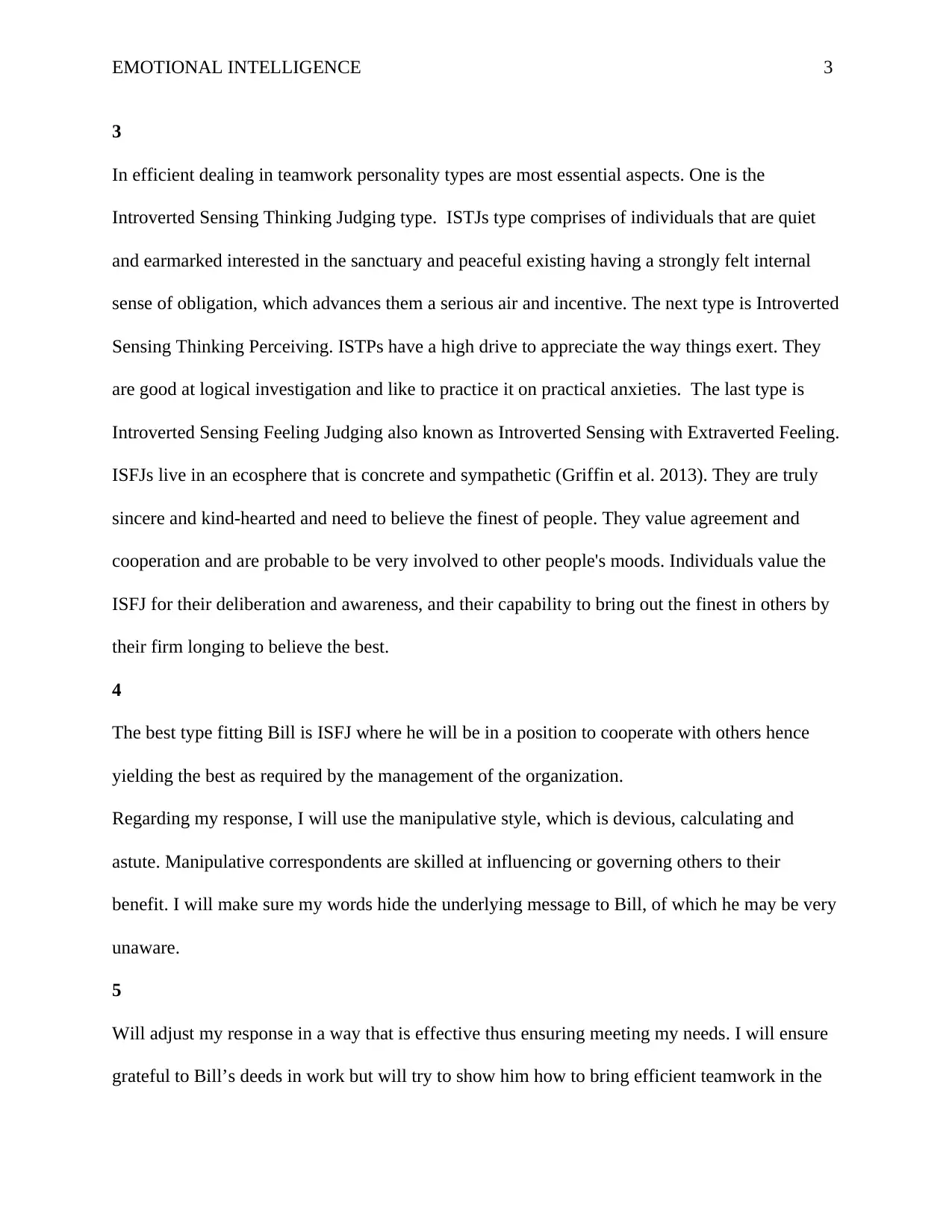
EMOTIONAL INTELLIGENCE 3
3
In efficient dealing in teamwork personality types are most essential aspects. One is the
Introverted Sensing Thinking Judging type. ISTJs type comprises of individuals that are quiet
and earmarked interested in the sanctuary and peaceful existing having a strongly felt internal
sense of obligation, which advances them a serious air and incentive. The next type is Introverted
Sensing Thinking Perceiving. ISTPs have a high drive to appreciate the way things exert. They
are good at logical investigation and like to practice it on practical anxieties. The last type is
Introverted Sensing Feeling Judging also known as Introverted Sensing with Extraverted Feeling.
ISFJs live in an ecosphere that is concrete and sympathetic (Griffin et al. 2013). They are truly
sincere and kind-hearted and need to believe the finest of people. They value agreement and
cooperation and are probable to be very involved to other people's moods. Individuals value the
ISFJ for their deliberation and awareness, and their capability to bring out the finest in others by
their firm longing to believe the best.
4
The best type fitting Bill is ISFJ where he will be in a position to cooperate with others hence
yielding the best as required by the management of the organization.
Regarding my response, I will use the manipulative style, which is devious, calculating and
astute. Manipulative correspondents are skilled at influencing or governing others to their
benefit. I will make sure my words hide the underlying message to Bill, of which he may be very
unaware.
5
Will adjust my response in a way that is effective thus ensuring meeting my needs. I will ensure
grateful to Bill’s deeds in work but will try to show him how to bring efficient teamwork in the
3
In efficient dealing in teamwork personality types are most essential aspects. One is the
Introverted Sensing Thinking Judging type. ISTJs type comprises of individuals that are quiet
and earmarked interested in the sanctuary and peaceful existing having a strongly felt internal
sense of obligation, which advances them a serious air and incentive. The next type is Introverted
Sensing Thinking Perceiving. ISTPs have a high drive to appreciate the way things exert. They
are good at logical investigation and like to practice it on practical anxieties. The last type is
Introverted Sensing Feeling Judging also known as Introverted Sensing with Extraverted Feeling.
ISFJs live in an ecosphere that is concrete and sympathetic (Griffin et al. 2013). They are truly
sincere and kind-hearted and need to believe the finest of people. They value agreement and
cooperation and are probable to be very involved to other people's moods. Individuals value the
ISFJ for their deliberation and awareness, and their capability to bring out the finest in others by
their firm longing to believe the best.
4
The best type fitting Bill is ISFJ where he will be in a position to cooperate with others hence
yielding the best as required by the management of the organization.
Regarding my response, I will use the manipulative style, which is devious, calculating and
astute. Manipulative correspondents are skilled at influencing or governing others to their
benefit. I will make sure my words hide the underlying message to Bill, of which he may be very
unaware.
5
Will adjust my response in a way that is effective thus ensuring meeting my needs. I will ensure
grateful to Bill’s deeds in work but will try to show him how to bring efficient teamwork in the
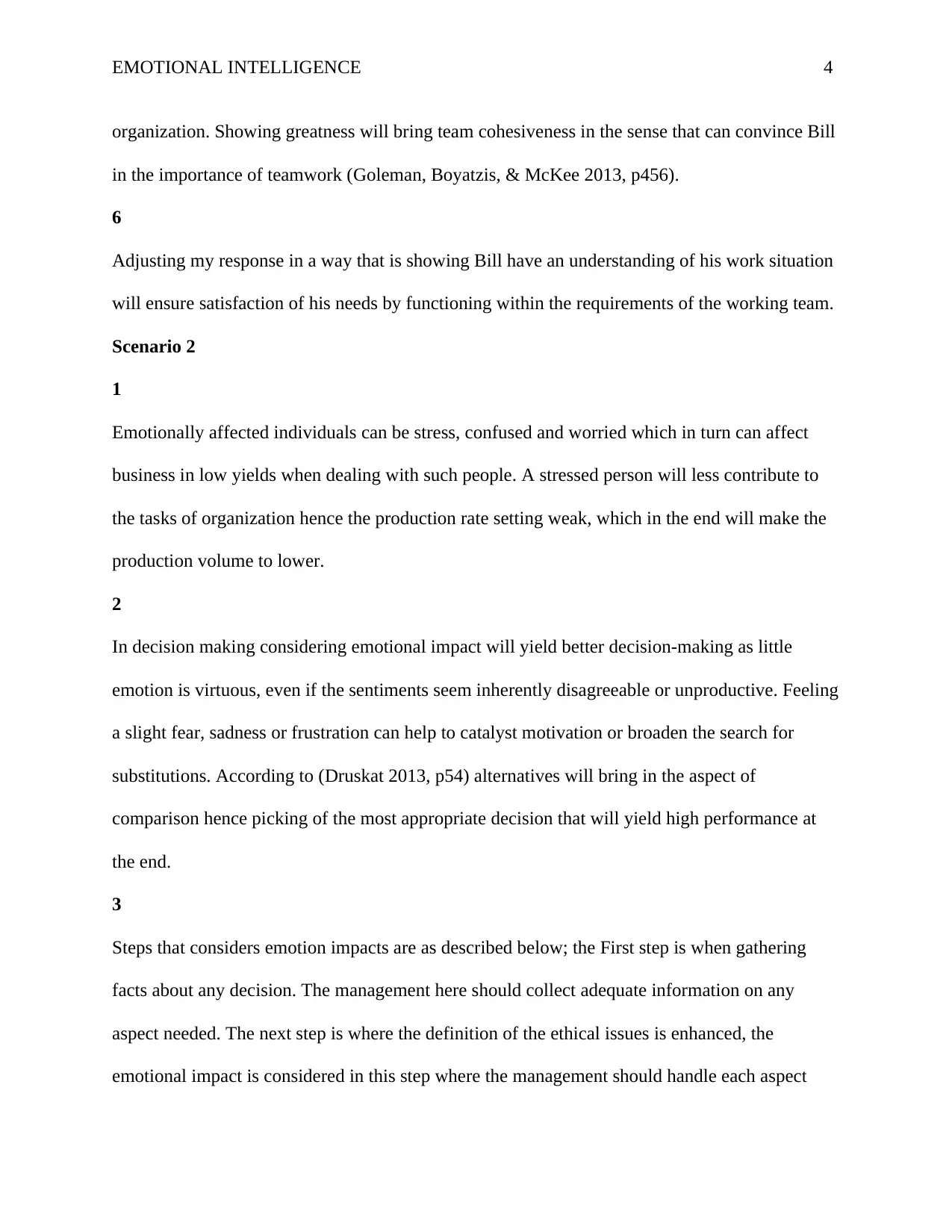
EMOTIONAL INTELLIGENCE 4
organization. Showing greatness will bring team cohesiveness in the sense that can convince Bill
in the importance of teamwork (Goleman, Boyatzis, & McKee 2013, p456).
6
Adjusting my response in a way that is showing Bill have an understanding of his work situation
will ensure satisfaction of his needs by functioning within the requirements of the working team.
Scenario 2
1
Emotionally affected individuals can be stress, confused and worried which in turn can affect
business in low yields when dealing with such people. A stressed person will less contribute to
the tasks of organization hence the production rate setting weak, which in the end will make the
production volume to lower.
2
In decision making considering emotional impact will yield better decision-making as little
emotion is virtuous, even if the sentiments seem inherently disagreeable or unproductive. Feeling
a slight fear, sadness or frustration can help to catalyst motivation or broaden the search for
substitutions. According to (Druskat 2013, p54) alternatives will bring in the aspect of
comparison hence picking of the most appropriate decision that will yield high performance at
the end.
3
Steps that considers emotion impacts are as described below; the First step is when gathering
facts about any decision. The management here should collect adequate information on any
aspect needed. The next step is where the definition of the ethical issues is enhanced, the
emotional impact is considered in this step where the management should handle each aspect
organization. Showing greatness will bring team cohesiveness in the sense that can convince Bill
in the importance of teamwork (Goleman, Boyatzis, & McKee 2013, p456).
6
Adjusting my response in a way that is showing Bill have an understanding of his work situation
will ensure satisfaction of his needs by functioning within the requirements of the working team.
Scenario 2
1
Emotionally affected individuals can be stress, confused and worried which in turn can affect
business in low yields when dealing with such people. A stressed person will less contribute to
the tasks of organization hence the production rate setting weak, which in the end will make the
production volume to lower.
2
In decision making considering emotional impact will yield better decision-making as little
emotion is virtuous, even if the sentiments seem inherently disagreeable or unproductive. Feeling
a slight fear, sadness or frustration can help to catalyst motivation or broaden the search for
substitutions. According to (Druskat 2013, p54) alternatives will bring in the aspect of
comparison hence picking of the most appropriate decision that will yield high performance at
the end.
3
Steps that considers emotion impacts are as described below; the First step is when gathering
facts about any decision. The management here should collect adequate information on any
aspect needed. The next step is where the definition of the ethical issues is enhanced, the
emotional impact is considered in this step where the management should handle each aspect
Paraphrase This Document
Need a fresh take? Get an instant paraphrase of this document with our AI Paraphraser
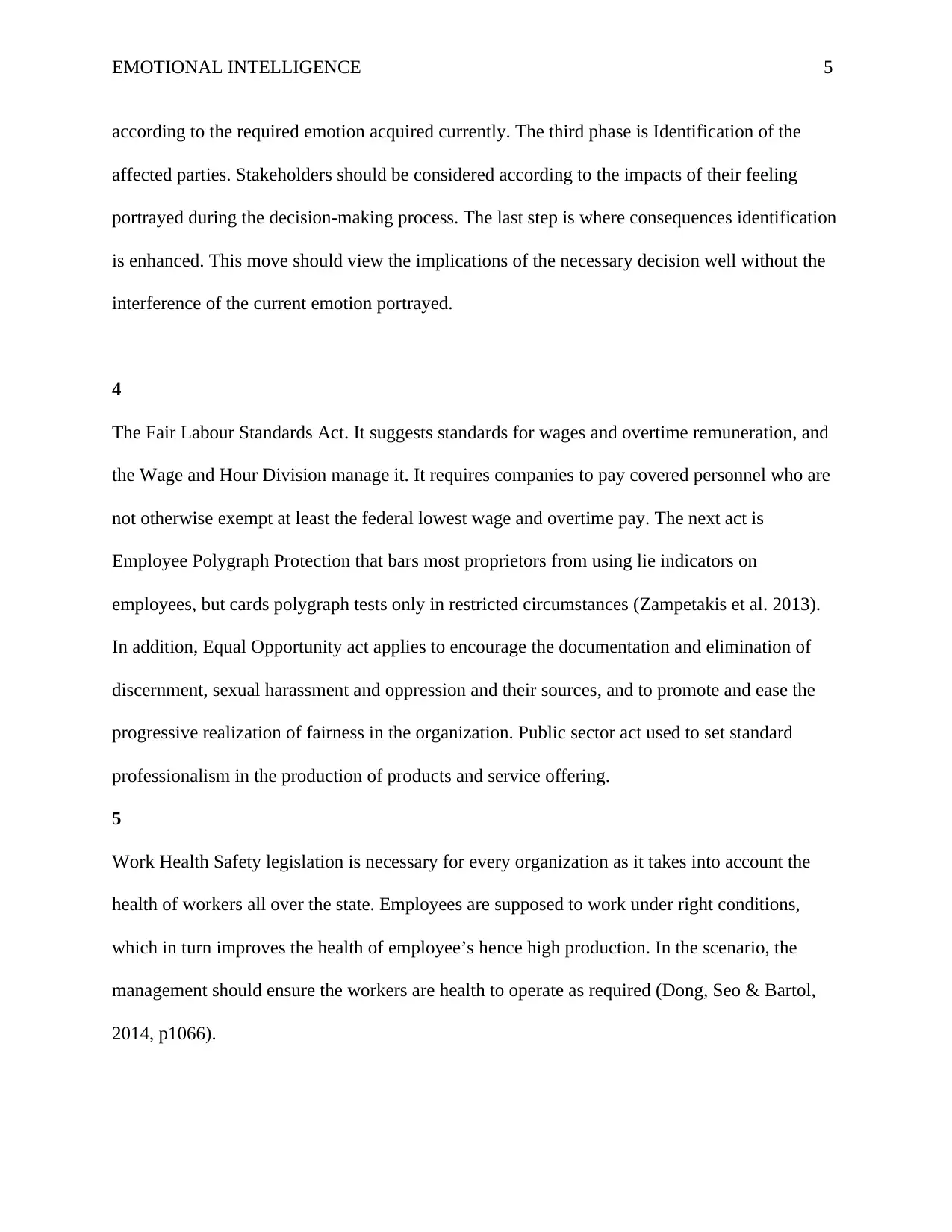
EMOTIONAL INTELLIGENCE 5
according to the required emotion acquired currently. The third phase is Identification of the
affected parties. Stakeholders should be considered according to the impacts of their feeling
portrayed during the decision-making process. The last step is where consequences identification
is enhanced. This move should view the implications of the necessary decision well without the
interference of the current emotion portrayed.
4
The Fair Labour Standards Act. It suggests standards for wages and overtime remuneration, and
the Wage and Hour Division manage it. It requires companies to pay covered personnel who are
not otherwise exempt at least the federal lowest wage and overtime pay. The next act is
Employee Polygraph Protection that bars most proprietors from using lie indicators on
employees, but cards polygraph tests only in restricted circumstances (Zampetakis et al. 2013).
In addition, Equal Opportunity act applies to encourage the documentation and elimination of
discernment, sexual harassment and oppression and their sources, and to promote and ease the
progressive realization of fairness in the organization. Public sector act used to set standard
professionalism in the production of products and service offering.
5
Work Health Safety legislation is necessary for every organization as it takes into account the
health of workers all over the state. Employees are supposed to work under right conditions,
which in turn improves the health of employee’s hence high production. In the scenario, the
management should ensure the workers are health to operate as required (Dong, Seo & Bartol,
2014, p1066).
according to the required emotion acquired currently. The third phase is Identification of the
affected parties. Stakeholders should be considered according to the impacts of their feeling
portrayed during the decision-making process. The last step is where consequences identification
is enhanced. This move should view the implications of the necessary decision well without the
interference of the current emotion portrayed.
4
The Fair Labour Standards Act. It suggests standards for wages and overtime remuneration, and
the Wage and Hour Division manage it. It requires companies to pay covered personnel who are
not otherwise exempt at least the federal lowest wage and overtime pay. The next act is
Employee Polygraph Protection that bars most proprietors from using lie indicators on
employees, but cards polygraph tests only in restricted circumstances (Zampetakis et al. 2013).
In addition, Equal Opportunity act applies to encourage the documentation and elimination of
discernment, sexual harassment and oppression and their sources, and to promote and ease the
progressive realization of fairness in the organization. Public sector act used to set standard
professionalism in the production of products and service offering.
5
Work Health Safety legislation is necessary for every organization as it takes into account the
health of workers all over the state. Employees are supposed to work under right conditions,
which in turn improves the health of employee’s hence high production. In the scenario, the
management should ensure the workers are health to operate as required (Dong, Seo & Bartol,
2014, p1066).
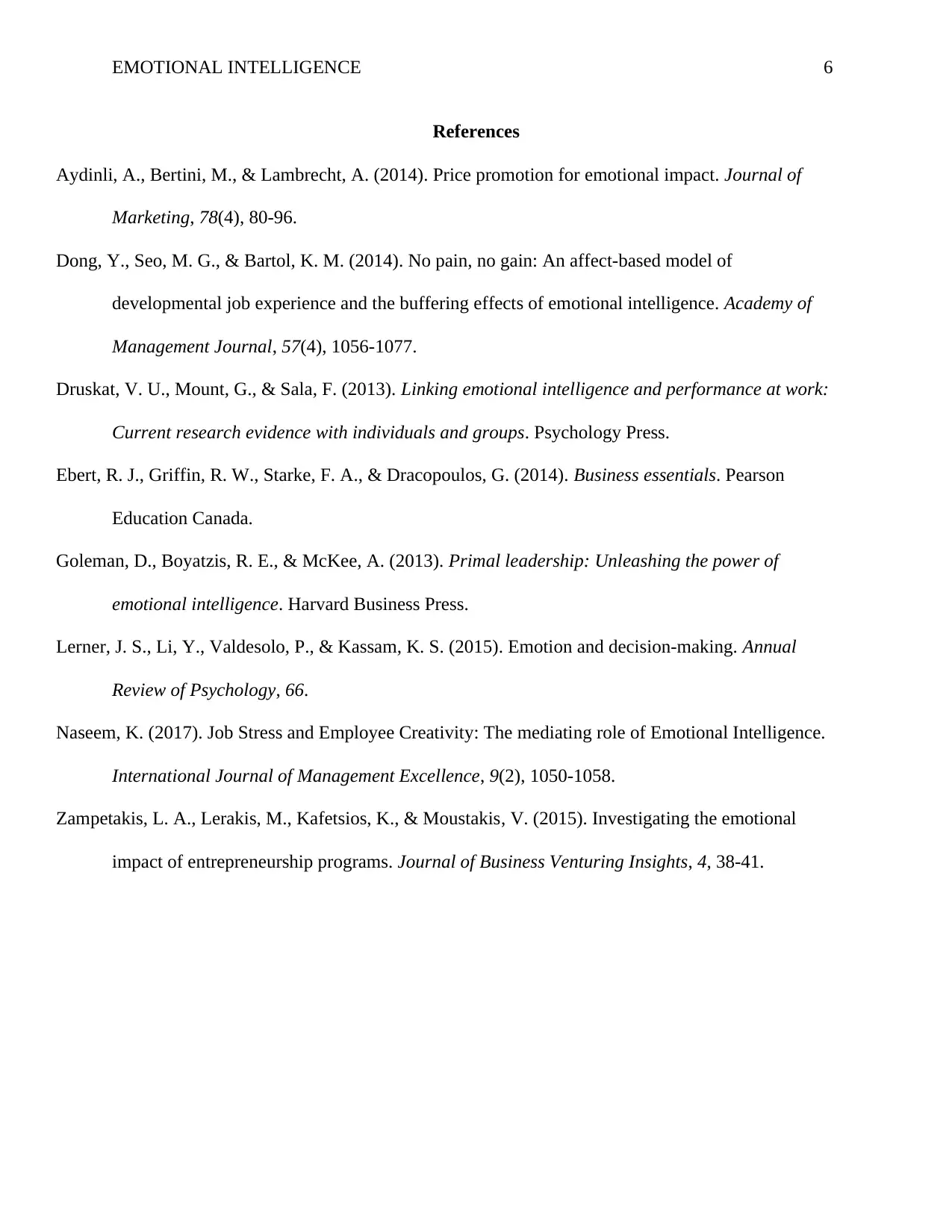
EMOTIONAL INTELLIGENCE 6
References
Aydinli, A., Bertini, M., & Lambrecht, A. (2014). Price promotion for emotional impact. Journal of
Marketing, 78(4), 80-96.
Dong, Y., Seo, M. G., & Bartol, K. M. (2014). No pain, no gain: An affect-based model of
developmental job experience and the buffering effects of emotional intelligence. Academy of
Management Journal, 57(4), 1056-1077.
Druskat, V. U., Mount, G., & Sala, F. (2013). Linking emotional intelligence and performance at work:
Current research evidence with individuals and groups. Psychology Press.
Ebert, R. J., Griffin, R. W., Starke, F. A., & Dracopoulos, G. (2014). Business essentials. Pearson
Education Canada.
Goleman, D., Boyatzis, R. E., & McKee, A. (2013). Primal leadership: Unleashing the power of
emotional intelligence. Harvard Business Press.
Lerner, J. S., Li, Y., Valdesolo, P., & Kassam, K. S. (2015). Emotion and decision-making. Annual
Review of Psychology, 66.
Naseem, K. (2017). Job Stress and Employee Creativity: The mediating role of Emotional Intelligence.
International Journal of Management Excellence, 9(2), 1050-1058.
Zampetakis, L. A., Lerakis, M., Kafetsios, K., & Moustakis, V. (2015). Investigating the emotional
impact of entrepreneurship programs. Journal of Business Venturing Insights, 4, 38-41.
References
Aydinli, A., Bertini, M., & Lambrecht, A. (2014). Price promotion for emotional impact. Journal of
Marketing, 78(4), 80-96.
Dong, Y., Seo, M. G., & Bartol, K. M. (2014). No pain, no gain: An affect-based model of
developmental job experience and the buffering effects of emotional intelligence. Academy of
Management Journal, 57(4), 1056-1077.
Druskat, V. U., Mount, G., & Sala, F. (2013). Linking emotional intelligence and performance at work:
Current research evidence with individuals and groups. Psychology Press.
Ebert, R. J., Griffin, R. W., Starke, F. A., & Dracopoulos, G. (2014). Business essentials. Pearson
Education Canada.
Goleman, D., Boyatzis, R. E., & McKee, A. (2013). Primal leadership: Unleashing the power of
emotional intelligence. Harvard Business Press.
Lerner, J. S., Li, Y., Valdesolo, P., & Kassam, K. S. (2015). Emotion and decision-making. Annual
Review of Psychology, 66.
Naseem, K. (2017). Job Stress and Employee Creativity: The mediating role of Emotional Intelligence.
International Journal of Management Excellence, 9(2), 1050-1058.
Zampetakis, L. A., Lerakis, M., Kafetsios, K., & Moustakis, V. (2015). Investigating the emotional
impact of entrepreneurship programs. Journal of Business Venturing Insights, 4, 38-41.
1 out of 6
Related Documents
Your All-in-One AI-Powered Toolkit for Academic Success.
+13062052269
info@desklib.com
Available 24*7 on WhatsApp / Email
![[object Object]](/_next/static/media/star-bottom.7253800d.svg)
Unlock your academic potential
© 2024 | Zucol Services PVT LTD | All rights reserved.





